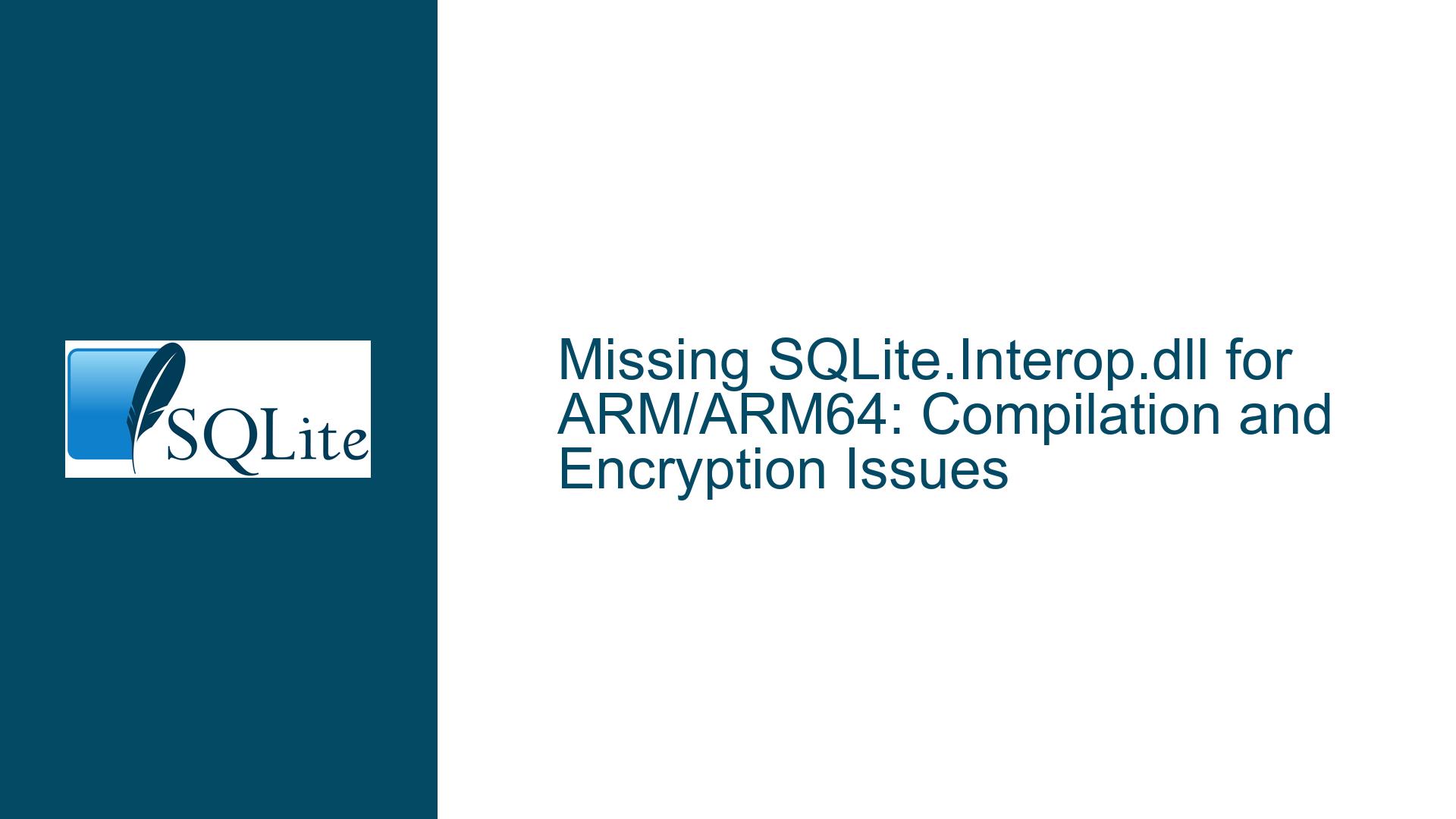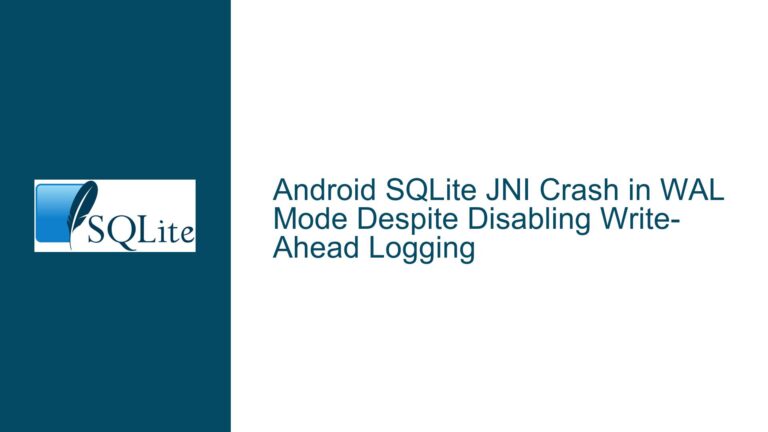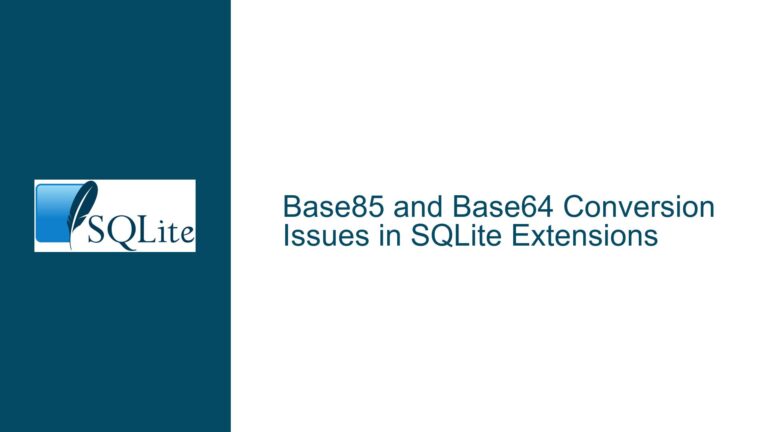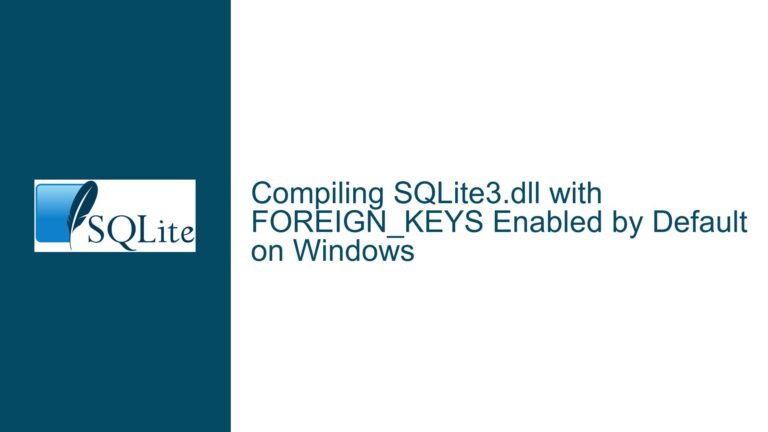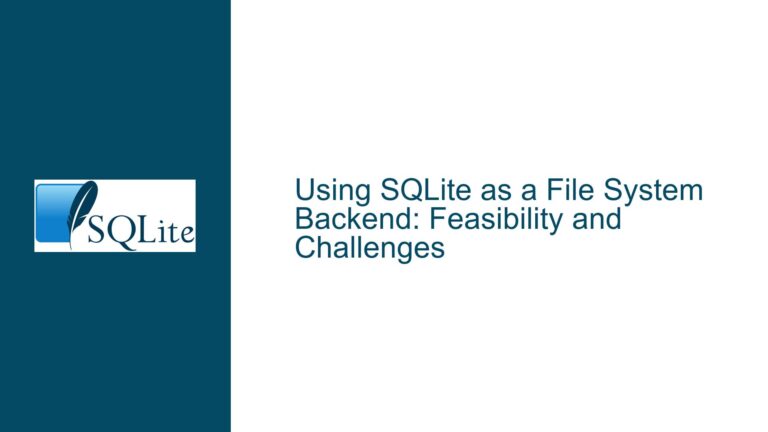Missing SQLite.Interop.dll for ARM/ARM64: Compilation and Encryption Issues
Understanding the Core Challenges with SQLite.Interop.dll on ARM/ARM64 Platforms
1. ARM/ARM64 Platform Compatibility and Pre-Compiled Binary Availability
The absence of pre-compiled SQLite.Interop.dll binaries for ARM and ARM64 architectures is the primary issue. SQLite’s official distribution does not include pre-built binaries for these architectures, forcing developers to compile the library manually. This challenge is compounded by platform-specific nuances:
Operating System Fragmentation: ARM devices run diverse OS environments (e.g., Raspbian on Raspberry Pi 4, Windows 10/11 ARM64 on Surface Pro X). Each requires distinct build configurations. For example, Raspbian uses GNU/Linux toolchains, while Windows ARM64 relies on Visual Studio’s MSVC compiler.
Encryption Extensions: The
sqlite3_keyfunction is part of SQLite’s encryption extension (e.g., SQLCipher or SEE). These extensions require compile-time flags (SQLITE_HAS_CODEC,SQLITE_TEMP_STORE=2) to enable API visibility. Omitting these flags results inEntryPointNotFoundExceptionerrors, as the native DLL lacks the required symbols.Managed-to-Native Interop: Libraries like
System.Data.SQLite.Coredepend on the nativeSQLite.Interop.dllto expose low-level functions. Mismatched architectures (e.g., x64 DLL loaded into an ARM64 process) or incomplete builds break this interop layer.
2. Common Root Causes of Compilation Failures and Runtime Errors
Incomplete Build Configuration
The SQLite source code must be compiled with ARM/ARM64 toolchains and platform-specific settings. Developers often overlook:
- Target Architecture Flags: Failing to specify
-target arm64(Clang) or/MACHINE:ARM64(MSVC). - Dependency Isolation: ARM builds may require statically linking dependencies like OpenSSL for encryption, which are not present in default toolchain paths.
Missing Encryption Support
The sqlite3_key function is excluded by default. To include it:
- Integrate SQLCipher or SEE source code into the SQLite build.
- Define
SQLITE_HAS_CODECandSQLITE_ENABLE_LOAD__EXTENSION. - Link cryptographic libraries (e.g., OpenSSL’s
libcrypto.aon Linux).
Runtime Deployment Missteps
Even a correctly compiled DLL may fail due to:
- File Placement:
SQLite.Interop.dllmust reside inruntimes/[os]-[arch]/native(e.g.,runtimes/win-arm64/native) for .NET’s runtime resolver to detect it. - Mixed Bitness: Deploying a 32-bit ARM DLL to a 64-bit ARM64 process causes silent failures.
3. Step-by-Step Solutions for Building, Deploying, and Validating SQLite.Interop.dll
Compiling for Windows ARM64 with Encryption Support
Install Prerequisites:
- Visual Studio 2022 with “Desktop development with C++” and “Universal Windows Platform (ARM64)” workloads.
- SQLCipher source code merged into SQLite’s
amalgamationfolder.
Configure CMake:
cmake_minimum_required(VERSION 3.15) project(SQLiteInterop) add_library(SQLiteInterop SHARED sqlite3.c) target_compile_definitions(SQLiteInterop PRIVATE SQLITE_HAS_CODEC SQLITE_ENABLE_LOAD_EXTENSION) target_link_libraries(SQLiteInterop PRIVATE "crypto.lib") # OpenSSL library set_target_properties(SQLiteInterop PROPERTIES OUTPUT_NAME "SQLite.Interop")Build with MSVC:
Open “Developer Command Prompt for VS 2022” and run:cmake -G "Visual Studio 17 2022" -A ARM64 . msbuild SQLiteInterop.sln /p:Configuration=Release
Cross-Compiling for Raspbian (ARMv8)
Set Up Cross-Compiler:
Installgcc-arm-linux-gnueabihfandg++-arm-linux-gnueabihfon Ubuntu.Build SQLite with SQLCipher:
export CC=arm-linux-gnueabihf-gcc ./configure --host=arm-linux-gnueabihf \ --enable-tempstore=yes \ CFLAGS="-DSQLITE_HAS_CODEC -DSQLITE_ENABLE_LOAD_EXTENSION" \ LDFLAGS="-lcrypto" make
Validating the Compiled DLL
Check Exported Symbols:
- Windows:
dumpbin /EXPORTS SQLite.Interop.dll | findstr sqlite3_key - Linux:
nm -D libSQLite.Interop.so | grep sqlite3_key
- Windows:
Runtime Testing:
Deploy the DLL to a test project and execute:using (var conn = new SQLiteConnection("Data Source=test.db;Password=encrypted")) { conn.Open(); // Triggers sqlite3_key call }
Community Workarounds and Long-Term Maintenance
- Pre-Built Binaries: Use community repositories like tkf144/System.Data.SQLite-ARM64 as a stopgap. Verify checksums to ensure integrity.
- CI/CD Automation: Create a pipeline that cross-compiles SQLite for ARM/ARM64 using GitHub Actions or Azure DevOps. Example YAML snippet:
jobs: build_arm64: runs-on: ubuntu-latest steps: - uses: actions/checkout@v4 - name: Install ARM64 Toolchain run: sudo apt-get install gcc-aarch64-linux-gnu - name: Build SQLite.Interop.dll run: | export CC=aarch64-linux-gnu-gcc ./configure --host=aarch64-linux-gnu \ CFLAGS="-DSQLITE_HAS_CODEC" \ LDFLAGS="-lcrypto" make
By addressing compilation flags, platform toolchains, and deployment workflows, developers can resolve SQLite.Interop.dll issues on ARM/ARM64 systems. Proactive validation of encryption symbols and leveraging community resources bridge the gap until official binaries become available.
